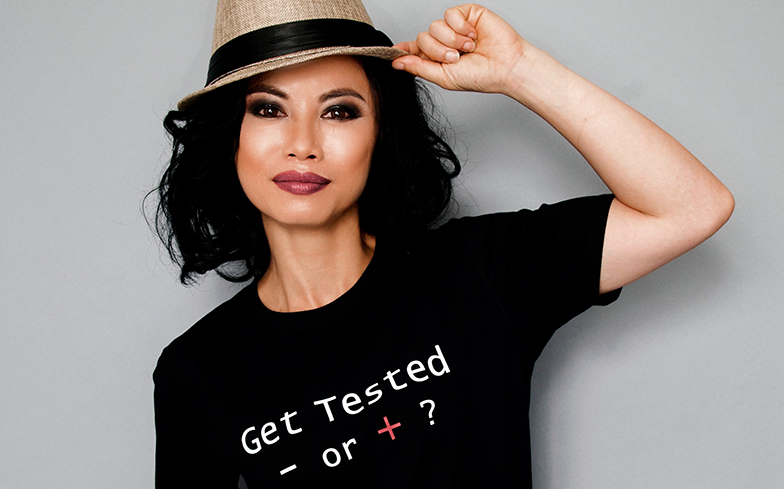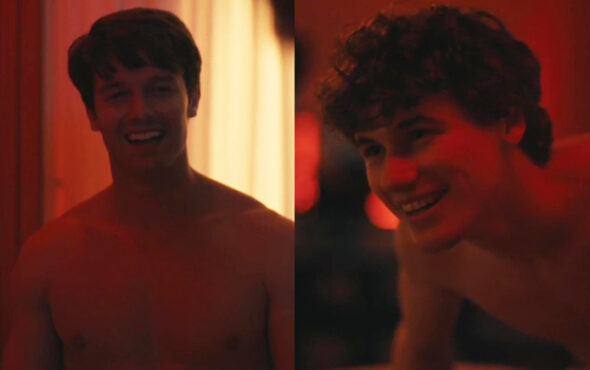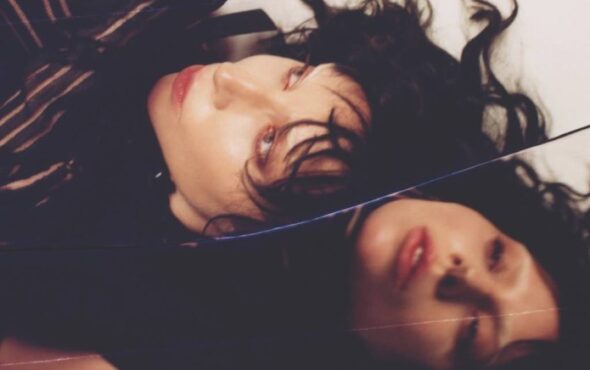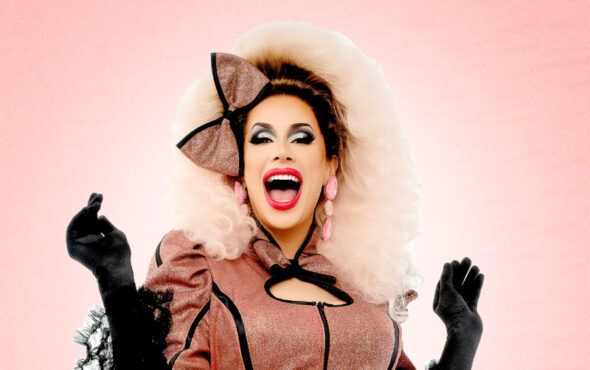
“We just haven’t done a good enough job in making sports welcoming for ethnic minorities.”
Amazin LêThị hasn’t had the easiest of lives. During her childhood, she had a “humiliating” experience with a teacher, and during her adolescence, she faced homelessness and struggled with severe depression. Despite her negative experiences, she was undeterred, becoming an accomplished weightlifter and bodybuilder and now fights for better Asian and LGBTQ representation in sports.
“We’re in a very unique situation where all the major sports events will be in Asia,” she tells GAY TIMES. Despite this, representation for out Asian athletes is incredibly low, and Amazin is working with the UK government and as an ambassador for organisations like Stonewall and Athlete Ally to change the situation.
But it’s not just sports where Amazin campaigns. HIV/AIDs awareness is incredibly low in Asia, and that presents its own unique challenges. She tells us that some Asian countries used to say that people suffering from the illness simply didn’t exist, and that some people who know she’s a HIV activist refuse to shake her hand, believing they’ll catch the disease.
GAY TIMES caught up with Amazin to discuss how sport can become more welcoming for Asian and LGBTQ players, as well as her activism in HIV/AIDs awareness.
Tell us about your role as a Sport Ambassador for Stonewall.
At the end of last year, I became the first Asian Stonewall Sports Champion Ambassador, there’s only eleven. This is a very important role because Stonewall UK is the biggest LGBTQ organisation in Europe and one of the biggest in the world, and the only LGBTQ organisation of this size to have a sports department with a Sports Ambassador role. Being the only Asian Sports Ambassador is important because if you look at the British-Asian community, we don’t have any out British-Asian sports professional athletes, and in the world we have so few, and we face so many different and unique challenges and barriers in sport. It’s important that I have this larger platform to be able to share my story and be able to talk about the challenges and barriers that other Asian LGBTQ athletes face. And for the first time for young Asian kids in the UK and around the world to see themselves and hear their story.
Stonewall has campaigns like the Rainbow Laces, how important do you think campaigns like that are to promote LGBTQ visibility in sports?
Just over a year ago, I became the first out Asian athlete to appear in the Rainbow Laces campaign. We’ve done so well in challenging homophobia and transphobia in sport, but there’s still so much more we need to do. When you look at rugby and football in the UK, we lack professional out football players. But if you look at women’s soccer, you have Megan [Rapinoe] and you have so many more out female professional football and soccer players. Rainbow Laces is important because it’s just that visibility of LGBTQ and allyship – particularly allyship. That’s so important in sports because of what happens when I’m not in the room and the allies that stand up for me.
You mentioned there how women’s sports, particularly football, generally seem more accepting of LGBTQ players, why do you think this is?
I think it’s unfortunate because in women’s sports there’s always been that stereotype if women play a certain sport they’re seen as lesbians and it’s seen as more acceptable. I think sports have this very specific gender norm of what women should be and what men should be. I think men’s sports, particularly when you look at rugby and football and soccer, they’re seen as very masculine sports and very heteronormative sports, and men being gay in those sports kind of goes against the norm. Obviously, it’s having those discussions that sport should be welcoming for everyone, but also dismantling this masculinity in sports that holds many LGBTQ men back from coming out.
We have recently seen more LGBTQ athletes come out, what do you think can be done to keep that going?
Storytelling is so important, that we need to continually share our story and normalise that it’s okay to be out in sport and sport should be welcoming for everyone. But it’s not just on the athletes, it’s on the sports bodies, the coaches, the government. It’s also on businesses as well, because without businesses sports events couldn’t happen, and many athletes have high levels of sponsorships and there’s that fear of ‘If I come out, I might lose my sponsor. I don’t know how my coach might feel, or my team or the fanbase.’ We still have a lot of work to do there. The last frontier is particularly in the fanbase, we see so much racism and homophobia and transphobia particularly when someone steps out onto the field and 80,000 people are chanting racist or sexist or homophobic slurs. There needs to be much more education in terms of the fanbase. But also sports organisations and the local authority clamping down and saying it’s not okay as a fan to come to a sports event and transmit any form of hate towards a player.

You mentioned earlier that we have a lack of out Asian athletes, what do you think can be done to help Asian athletes speak more openly about their identities?
For me, sharing my story, and I think Asian athletes need more allies in the sports community. There was a story recently in the Metro regarding the lack of ethnic minorities in sports and the inequality there. And it doesn’t just come down to the inequality, it comes down to the cultural barriers, it comes down to the stereotype. It’s not just in professional sports, we need to go right back into the school system to look into why Asian kids have the lowest rate of participating in sports, but also the highest dropout rate when they do participate in sport, and what work we need to do around there in terms of making sport feel welcoming for children, but also if they move to the youth sports and they get to the academy, the unconscious bias towards them for why they’re not chosen for the academy. That also hampers and creates barriers as to why we don’t see many professional Asian athletes in sports. When you look at the fact that over the next few years, we’re in a very unique situation where all the major sports events will be in Asia. The UK is sending its best sportspeople from the UK to Asia for all these events, starting from the Tokyo 2020 Olympics, but they’re not sending their best British-Asian athletes, and that’s a problem because the face of the UK is changing, but the face of sports hasn’t changed. It’s predominately very white in the UK and also around the world. We just haven’t done a good enough job in making sports welcoming for ethnic minorities. And it comes down to that double whammy that we receive racism in sports, but if we’re from the LGBTQ community we face homophobia and transphobia so it’s a double layer of hate we receive, and if we’re female it’s a triple layer.
Last year, the YouTuber Lilly Singh came out as bisexual, and in a post she wrote ‘Female: Check. Coloured: Check. Bisexual: Check’ and she noted although these were obstacles, they were also superpowers, does that correlate to your own experiences as an out and Asian person?
Yes, I see all of my intersectionalities as a superpower: I’m Asian, I’m a woman and I’m a proud member of the LGBTQ community, and I think that we have to turn what the world might see as negatives towards us as our superpowers, as this is what makes me unique in terms of the conversations I can have, particularly the intersectional stories I can have. My story is very unique and it resonates with a certain community, my own community.
What do you think we can do to help the Asian LGBTQ community feel more supported?
I keep going back to allyship. Allyship is so important in the community because there is a lot of racism within the LGBTQ community towards ethnic minority groups, just as much as there is a lot of transphobia within the LGB community. It’s about raising your voice and being that ally when I’m not in the room stating that being racist is not okay, being homophobic and transphobic is not okay. When you look at British sports or globally, you will see very few Asian faces, so it will be difficult if you feel alone; if you have a team of 30 people and you’re that one Asian athlete. If someone says something to you, if that’s a racist slur or if it’s anti-LGBTQ, you would hope that your teammates, and your coach, and the sports organisation will support you, because the more people who raise their voice, the more we can dismantle homophobia and transphobia in sports. Athletes these days have this amazing platform that they didn’t have many years ago. And with the power of social media, many athletes have more followers than Madonna, so they have a power in terms of the message that they use, particularly if it’s for good and standing up for equality and LGBTQ equality, because they have followers who are LGBTQ. But also, those followers who aren’t from the community look up to their athletic heroes, so it means a lot when someone is an ally to the community.
Speaking about that platform, whenever someone like an athlete, or an actor, or a singer speaks out on a political issue, they’re told ‘stick in your lane’ what is your message to those people who say that?
It’s interesting you say that, as in the 2020 Tokyo Olympics, athletes aren’t allowed to say anything political. They’re being told ‘Stay in your lane, you’re an athlete and that’s all you should do.’ And for me, that is wrong because sport is something that brings everyone together and it’s an international platform. Athletes have this massive platform, and they should have that freedom of speech to say something because so many LGBTQ athletes have experienced homophobia and transphobia in sports, and to say to someone ‘you can’t speak up’ is wrong because homophobia, transphobia, sexism and racism doesn’t go away, and if we don’t speak up and pretend it hasn’t happened then there’s no way that we can change hearts and minds.
How important is it for you, as an out athlete, to be unashamedly proud of your identity, especially for people who might not have that confidence?
It’s really important because so many of us, particularly from ethnic minority groups, have been made to feel, from our community and our family, ashamed of who we are and that we’re somehow a failure because we haven’t fitted into the societal norm of what we should be as a woman or a man. And for me to be so unapologetic about who I am, and so out and proud, and to continually share my story, it shares a message to those struggling with their sexuality and gender identity that they’re not alone and that there are others exactly like them that have the exact same story. But it also helps to change hearts and minds of those who aren’t part of my community, or aren’t Asian to fully understand the challenges and barriers that we face in the community.

Since you started the Amazin LêThị Foundation, have you seen discourse around HIV improving within Asian communities?
We still have a difficulty because we don’t tend to talk about social issues. For a very long time in some Asian countries, they said people living with HIV never existed. But you passed someone living with HIV all the time, you just didn’t know. We have to normalise these issues and not stigmatise people that have certain health conditions because you can live a very long and happy life with HIV. The more we stigmatise it, the more we create a barrier for people not to come forward and share their status, and people not seeking help as well.
Why do you find HIV such an important topic to speak out on?
Just like being LGBTQ, there’s so much stigma around living with HIV, particularly that I see within the Asian community, and there’s also a lot of ignorance of how it’s transmitted. When I’m in Asia, and I’m dealing with the Asian community and people know I’m a HIV activist, sometimes people don’t want to shake my hand because they think you can still transmit HIV through shaking hands, or touching someone, or touching a cup. That’s what we have to dismantle as well, because those who are living with HIV are so marginalised to the corner of society because of this lack of education and ignorance. I think particularly in sports, as people are so stigmatised for being different, whether you’re from the LGBTQ community, or an ethnic minority, or have some kind of difference. People living with HIV shouldn’t be blocked out from playing sports either.
In the past, you’ve been open about your struggles with your mental health, and there’s a lot of taboo around talking about mental health. How important is it for people to be open on this subject, especially within the LGBTQ community?
The LGBTQ community have one of the highest rates of mental health [issues], and I think this comes down to the challenges and barriers in terms of coming out and how society doesn’t accept us. For many years, I’ve struggled with my mental health because I was bulled consistently as a child for being Asian and being part of the LGBTQ community. I was bullied in sports because I was Asian and being part of the LGBTQ community. For a period of time as a young adult, I was homeless, living in and out of shelters, extremely suicidal with severe depression. I think we need to normalise these issues because so many people suffer from depression or some form of mental health [issue], we all have our up days and our down days and it’s nothing to be ashamed about. Just like being LGBTQ, the more we speak about it, the more we change hearts and minds. I think mental health can be very difficult for the average person to get their head around because it’s not like a rash, I can’t see it, and because I can’t see it, you should be able to snap out of it, but for many people that’s not the case. And it’s not the answer to tell someone to snap out of it. In the Asian community, it is frowned upon and we don’t speak about it, and it’s something to be quite ashamed about, and that’s why I share my own story about my own mental health, because it’s the only way to normalise it change hearts and minds in the hopes that someone else will step forward and share their own mental health story.
During your youth in Australia, you had a teacher who said you weren’t going to amount to anything. And yet here you are as an accomplished sportsperson and activist, have you ever seen that teacher again?
No, I haven’t. And I think about the amount of bullying that goes on of LGBTQ kids, and not just from schoolmates or society, but also teachers. It stuck in my mind, because it was such a horrible experience, being made to stand up in front of my entire class, and my teacher pointing me out as the one child who was going to fail and then throwing a blackboard eraser at my head and everyone laughing at me. In that moment, I thought ‘I’ll never be humiliated by that, and I never want any child to be humiliated in that way because of their difference’ and that’s why I share my story, and do so much work around LGBTQ activism and consistently trying to change hearts and minds.
Do you have much hope for better LGBTQ representation in sport, in general and for Asian communities?
I do, and I believe it is changing. I do a lot of work with governments all over the world, and I’m currently collaborating with the UK government in all the major sports events coming up; Tokyo 2020, Beijing Olympics, and having conversations around the Commonwealth Games in Birmingham, that we need more representation from ethnic minority groups. I’m doing work with the city of London as well. It’s a step by step process, and I think the more people that are out and can share their stories, particularly as out athletes, the more we change hearts and minds and the more that other people can feel comfortable. Rainbow Laces has done an extraordinary job because it’s just massive now from where it came from to where it is now. But it’s continually being able to share our stories. We have to do so much more work in the school system to make sure that young kids from ethnic minority groups feel that they’re welcome in sports, and to make sure they continue to feel welcome and we can break down this unconscious bias particularly once they get to the academy level so they can be chosen.
What will this year and decade bring for Amazin LêThị?
Gosh, I’ve got so many exciting things coming up. I’m so excited that I’m a Sports Champion Ambassador for Stonewall, and I look forward to over the next year working with them. I’m an Athlete Ally Ambassador, an organisation based in the US, so I’m looking forward to working with them as well over the next year and decade. All these major sports events that are happening in Asia, I’m so excited to be working with the UK government and other governments around the world in terms of how we change hearts and minds at all these major sports events, and what kind of conversations, particularly LGBTQ conversations we can have. And then my work with my Foundation, I was the first in Asia to pilot a leadership and sports business and education programme that looks at fast tracking homeless LGBTQ people back into the workforce through sports and business. I will be launching that in both the US and UK over the next few years, so I’m really excited for that. And just continuing to share my story and the work that I do, because any given day we can change our hearts and minds and make sport more welcoming for everyone, and just generally within the LGBTQ community and community in large to make people more accepting of people different from them.
To find out more about the Amazin LêThị, click here.



